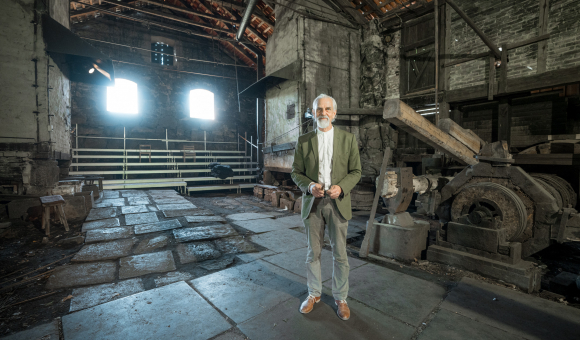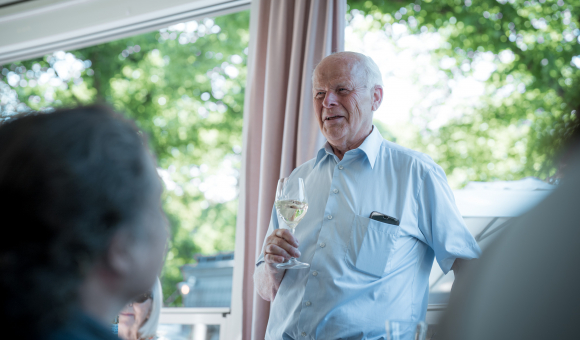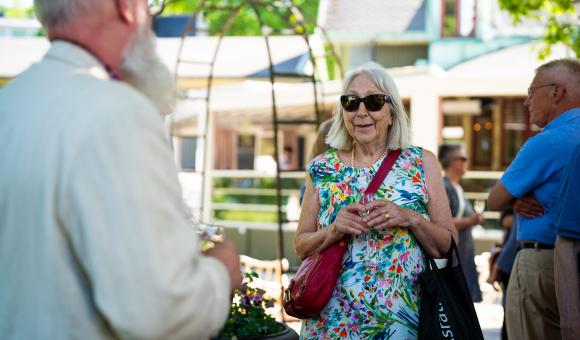
In Sweden today, the number of Swedes of Walloon origin is estimated at just over 800,000. This makes up almost a tenth of the population. It's enormous. Enough to make you want to go and meet them... Who are they? What do they do? And above all, what do they think of their ancestors? Does this past still mean something to them today? These are the thoughts of three women and two men, from Stockholm and Uppsala County.
Sanne Lennström, 34 (Social Democratic Party) and Lina Nordquist, 45 (Liberal Party), members of parliament
So, the first question so we can get to know each other: what's it like to have Walloon ancestors when you're Swedish ?
Lina Nordquist: To be honest, I don't think my genes are that important. What matters is to know that all Swedes benefit from this heritage. I'm convinced, although I didn't live in that time, that we wouldn't have become world leaders without the expertise of the Walloons. Our strength comes from this past. And today, this story is a good example of successful immigration, even if the Walloons didn't come knocking on our door. We needed them. And the contribution they made goes beyond the steel industry. We didn't have a schooling or pension system until they arrived. That's why they're still highly respected, and why people are proud to have Walloon blood.
Sanne Lennström: That's the case for me. My grandmother grew up and lived in a bruk where the Walloon tradition was still alive and well, and where people sang songs from long ago. For her, as for the others, it was very important to carry on the memory. So I do the same with my children, aged three and six years old. I believe it's important to pass on this knowledge of local history, within families and, above all, in schools. I don't know anyone who isn't interested in what the Walloons have given us. Genealogical research has also become very popular in recent years, too.
Meanwhile in Belgium, the history of the Walloons of Sweden is mostly unknown...
Sanne Lennström: It's sad because you have a lot to be proud of. As for us, we're proud of you. It's an exceptional heritage... And I'm convinced there's a way to share it. Maybe through tourism. Imagine visits to the bruks. You spend a day there, eating ice cream while also learning what the Walloons built there four centuries ago. It would be great to create QR codes that allow you to walk in the footsteps of the Walloons. And that way you could reconnect with your roots.
Sorry to interrupt, but your colleague has tears in her eyes. Why this emotion ?
Lina Nordquist: Because I find it really sad and unfortunate that something so fundamental to us is unknown to you! I can't believe that the people of Wallonia today have never heard of this. We learn about it in school and there are theatre productions about it. I really hope that will change.
Do you think you can help with this change ?
Sanne Lennström: Before that, we need to work on our origins, as some of our Walloon villages are in a poor state of repair. Österbruk, for example, is only pulling through thanks to the subsidies it receives. But this isn't the case in all villages, so we need to promote tourism. Improve what can be improved. That's why we'd like to bring people from the European Parliament here. With their interest in history, they could help us preserve these places.
Does the topic of Walloon origins interest you because you work in politics ? Or because you like history ?
Sanne Lennström: Both. But I think a lot of young Swedes are interested in it too. It's just that we need to find a way of attracting more of them to the Walloon villages. Visiting these places and looking from the perspective of heritage alone is not enough. We have to vary the attractions, with themed tours such as murder mysteries or even ghost stories. Kids love that! There's the legend of the white lady who haunts a garden in which she is said to have drowned, and who has been sticking her hand out of the lake ever since, holding a white handkerchief. Then there's the old man who creaks his rocking chair above the ceiling... I can tell you that when I was younger, I used to love doing this "special ghost tour", even if it was done by actors.
Lina Nordquist: Our goal today is to convince as many Swedish and European members of parliament as possible to create a Walloon network. This would allow us to come up with some good ideas for restoring some of our historic villages. When we have formal discussions around a table, people are less touched. But a network is more spontaneous, more human. There's no pressure. You can join in whenever you like. It's just like a club...
And what would happen to this Walloon network if you're not re-elected ?
Lina Nordquist: Its future will depend on those who believe in it and want to make it prosper.
Sanne Lennström: For that, we need to rally people who will still be members of parliament. Fortunately for us, many of them have Walloon ancestors. And as you know, identity isn't just any other topic. It's something that touches the heart. The best stories are the true ones.
Bengt Lindholm, Österbybruk guide
After spending my whole life in Stockholm, I wanted to find somewhere quiet to spend my retirement. And my wife and I came across a house for sale in Österbybruk. It was a miner's house and I don't know why, but something was drawing me there. Very quickly, I made sure to get involved in the life of the "bruk". And because of my interest in old buildings and ironworks, I ended up becoming a guide. I'm passionate about showing the positive side of migration. In many countries today, the idea of people moving around is seen in a negative light. But it's been around forever. And the example of the Walloons in Sweden shows just how enriching it can be. I believe it was the Walloon blood on my father's side that led me here. Who knows? One day, I'd like to go to Belgium to connect with these distant roots. I studied French very early on, but I don't speak it well. My favourite word in the language? A beer, please!
Anders Herou, President of the Society of Walloon Descendants
Having Walloon origins quickly makes you very interesting here. In fact, it's even more chic than saying you're part of the nobility. Personally, I grew up with the idea that Sweden owed a lot to Wallonia. Foreign workers had the skills that enabled them to produce high-quality steel. And they also brought their culture, demonstrated their sense of family... My father was so fascinated by this history that he began genealogical research. It goes all the way back to 1625... My name Herou comes from Henry. At the time, the priest who was making the registers misspelled it, because it was old French and he didn't understand my ancestor, who was a blacksmith. Today, I'm proud of the journey we've been on. I took my first trip to Wallonia in 2003, at a time when I was not yet active in the Society of Walloon Descendants. In 2009, I went back with a few members. And in 2014, there was so much enthusiasm that we quickly had to find more dates. The society now has 1,100 members, and it's celebrating its 85th anniversary this year*.
* The society is organising two trips back to its Walloon roots in 2024. 150 Swedes have already signed up.
Ingrid Wiken Bonde, member of the Society of Walloon Descendants
It was my mother who first told me about my Walloon ancestors who arrived in Sweden in the 17th century. It touched me to know that their popularity was linked to their contribution to the country's economy. So when I got to university, I wanted to carry out some research on them. I discovered that I had an ancestor called Sacha Fasing, and that he was originally from Liège. I went there five years ago with the society. But that wasn't the first time. I already knew Belgium, especially the Flemish region, because I taught Dutch in Sweden, would you believe it! It's funny how life works. I have Walloon origins yet I spend my life passing on the language of the other region in Belgium... You could say that I'm in favour of the unity of the country. And what's more, I can speak French !
By Nadia Salmi
This article comes from Revue W+B n°161.




